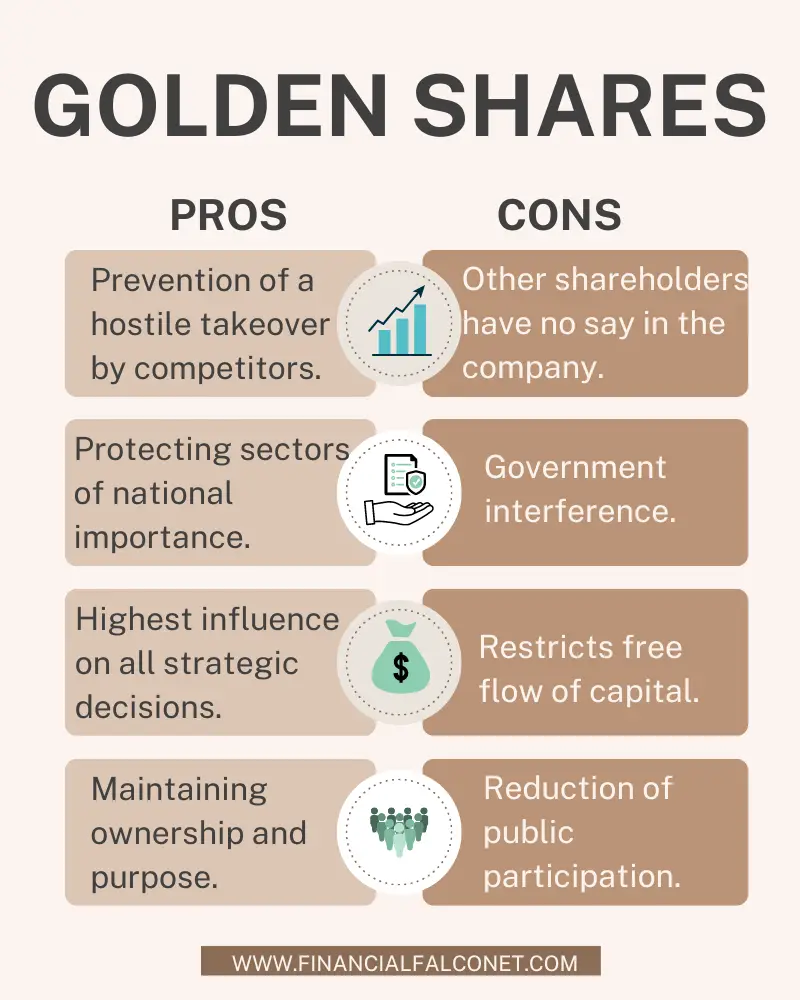What is a golden share in a company?
A golden share in a company is a single share that gives the shareholder the ability to have the final say in the corporate policies and decision-making processes of the issuing company. This is so because the golden share represents the majority or controlling share in a company which is usually at least fifty-one percent (51%) share.
There are several kinds of shares; this gives companies and investors a wide variety of options when issuing or purchasing shares respectively. Our focus here shall be on the concept of a golden share in a company and what it entails. We shall also consider the pros and cons of this type of share and its features.
When to use a golden share
A golden share can be issued either by a private company, a publicly traded company, or a government company that is undergoing privatization or has been recently privatized. Some of the processes in which the golden shareholder can outvote other shareholders include:
- Choosing the board of directors.
- Mergers and acquisitions.
- Issuing of shares.
- Making changes to the company’s charter.
- Sales or purchase of assets.
How are the golden shares issued?
Before the golden share is issued, the issuing company usually makes specific changes to its memorandum of association (MOA) and articles of association (AOA). The memorandum of association is a legal document signed by all the founding members of the company as an agreement to its establishment while the articles of association is a document that captures the objectives, rules, scope of work, and all other management-related issues such as how the company will be run, the powers and responsibilities of the board of directors, how stakeholders exert control on the company’s board, etc.
Private family-owned companies issue golden shares to allow a neutral third party to have a say in a situation of internal conflicts such as family disputes over who should be part of the board of directors, whether to make a certain purchase or not, and even business expansions.
Publicly traded companies issue these shares to protect their business and subsidiaries from external influences such as a forceful takeover by their competitors.
Government companies undergoing privatization or that have been recently privatized also issue a golden share which is usually held by a government official; this is aimed at giving the government some control in critical sectors that could have an impact on the country’s economy, security, and all other issues of national concerns.
The Golden shares were especially common in the 1980s in a lot of European countries when quite a number of government companies got privatized, and the government still sought to have influence in the various industry sectors. In 2003, the issuing of golden shares was banned by the European Union because it gives one person the ability to outvote other shareholders which consequently reduces the free flow of capital in the company. Presently, only companies in the United Kingdom are known to still issue golden shares which are usually held by the government.
Features
- Decisive vote.
- Government involvement.
Decisive vote
This means the holder of the golden share has the right to overrule all decisions that are taken at meetings, elections, policy formations, carter review, number of shares to issues, how many stocks a shareholder can own, assets sale, or purchase, etc. As a result of this, one person unilaterally decides the fate of the company.
Government involvement
In companies where the golden shareholder is the government, it breeches the freedom of establishment of public companies and gives the government the power to veto all actions of the company.
Pros and cons of golden shares

Pros
- Prevention of a hostile takeover by competitors.
- Protecting sectors of national importance.
- Maintaining ownership and purpose.
- Highest influence on all strategic decisions.
Listed above are the pros of issuing golden shares, we shall discuss each of these pros below:
Prevention of a hostile takeover by competitors
The issuance of golden shares prevents a hostile takeover of the issuing company by competitors either by proxy fight or tender offer. Proxify fight is when one company seeks to take over another company by soliciting other shareholders to vote out the current board of directors and replace them with their directors. A tender offer is when the company attempting the takeover offers shareholders a premium amount for the shares they own so that they can accumulate more shares to have the majority shares in the company. Neither of these hostile takeover approaches can work in a company that issues golden shares since the deciding vote resides with the golden shareholder.
Protect sectors of national importance
With the issuance of golden shares, sectors, and industries that have a direct influence on a country’s economy and national security such as transportation, energy, security, etc can be effectively managed to always consider national and public interest above personal gains to the company. This can be achieved since golden shares of these sectors are usually held by the government.
Maintain ownership and purpose
Golden shares aid in maintaining the ownership of a company and the purpose for which it was instituted; this is important for the company to grow effectively, maintain its vision, and prevent unnecessary changes in leadership which might have a negative impact on the overall wellbeing of the business. Additionally, it helps protect domestic-owned companies from being owned by foreigners.
Highest influence on all strategic decisions
The golden shareholder has the highest influence on all strategic decisions in the company since they have the deciding vote on company policies, board members’ constitutions, and other operational decisions of the company.
Cons
- Other shareholders have no say in the company.
- Government interference.
- Restricts free flow of capital.
- Reduction of public participation.
Other shareholders have no say in the company
Since the golden shareholder has the deciding vote, the opinions of other shareholders tend to be always neglected even in cases when the golden shareholders’ decision might not be in the company’s best interest. This can inadvertently hinder the company from growing effectively and benefitting from useful advice and perspectives of other stockholders.
Government interference
Since most governments are the ones who hold golden shares, it means the government has a final say on what the company can and cannot do. They also get to decide the extent of the services and products they can offer the public which might not be beneficial to the populace. This goes against the tenets of liberal economies that practice capitalism.
Restricts free flow of capital
There will be a restriction on the free flow of capital which goes against the tenets of liberal economies that practice capitalism and also restricts the growth of the company since all purchases, mergers, and acquisitions have to be approved by the golden shareholder.
Reduction of public participation
The public might be skeptical to invest in a company that has golden shares since they already know that even if they do invest in such a company, they have no impact on its governance and all other operating policies. Additionally, the golden shareholder can decide how many shares individuals or organizations can purchase in the company which can further impact public participation.
UK companies with golden shares held by the government
- Belfast International Airport.
- BG plc.
- British Aerospace.
- British Energy.
- Cable & Wireless.
- Devonport Dockyard.
- National Grid.
- National Power.
- Nirex.
- Northern Ireland Electricity.
- PowerGen.
- Rolls-Royce.
- Rosyth Dockyard.
- Sealink Stena Line.
- Scottish Power.
- Scottish Hydro-Electric.
- VSEL Consortium.
Although the issuance of golden shares has been banned by the European Union, the above-listed companies in the United Kingdom have golden shares which are held by the government.
FAQs
Are their US companies with golden shares?
Since the ban on the issuing of golden shares by the European Union, there are no US companies with golden shares.
What is the prominent feature of Golden Share?
The prominent feature of a golden share is the veto power it grants its holder.
In which companies does the UK government have a golden share?
The United Kingdom has golden shares in Belfast International Airport, BG plc, British Aerospace, British Energy, Cable & Wireless, Devonport Dockyard, National Grid and National Power. These are just a few; others have been listed above.
Conclusion
The issuance of a golden share by a company serves as a means of protecting the company from various unwanted external influences such as a hostile takeover as well as maintaining ownership so that it does not derail from its founding objectives and goals.
Governments such as the UK hold the golden shares of some companies as a means of protecting national interest; in this case, the golden share is held by the Secretary of State or someone acting on behalf of the government who will have the right to choose the company’s board of directors, speak at its meetings, approve changes to its articles of association and limit the purchase of the company’s shares by any individual or organization to not more than 15%.
Critics of the golden share opine that it gives its holder far too much power especially in its having the decisive vote in the issuing company.
However, whether or not golden shares are good or bad is subjective as the decisive vote serves as an advantage by leaving decision-making to a trusted person who could ensure the company fulfills its goals without interference from other shareholders who might not have a clear understanding of its goals.
Last Updated on November 6, 2023 by Nansel Nanzip BongdapBlessing's experience lies in business, finance, literature, and marketing. She enjoys writing or editing in these fields, reflecting her experiences and expertise in all the content that she writes.
